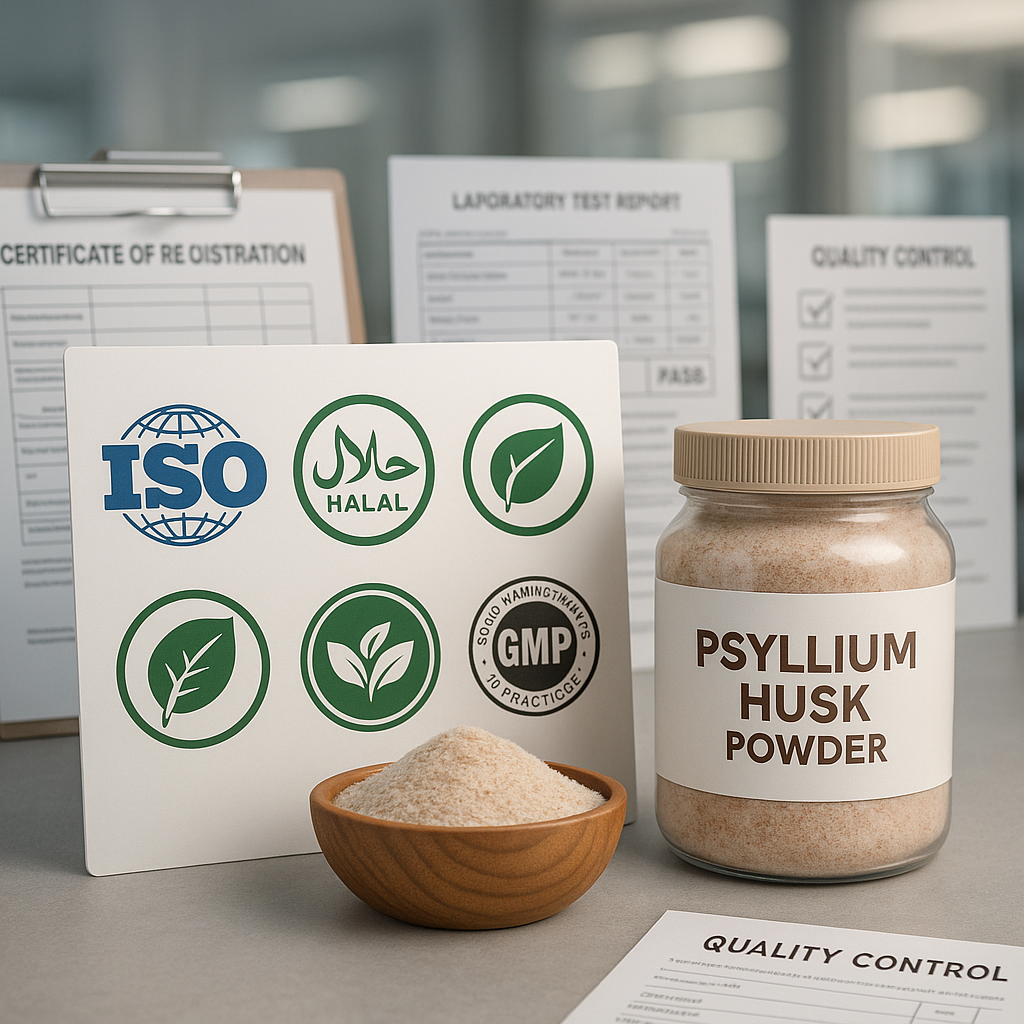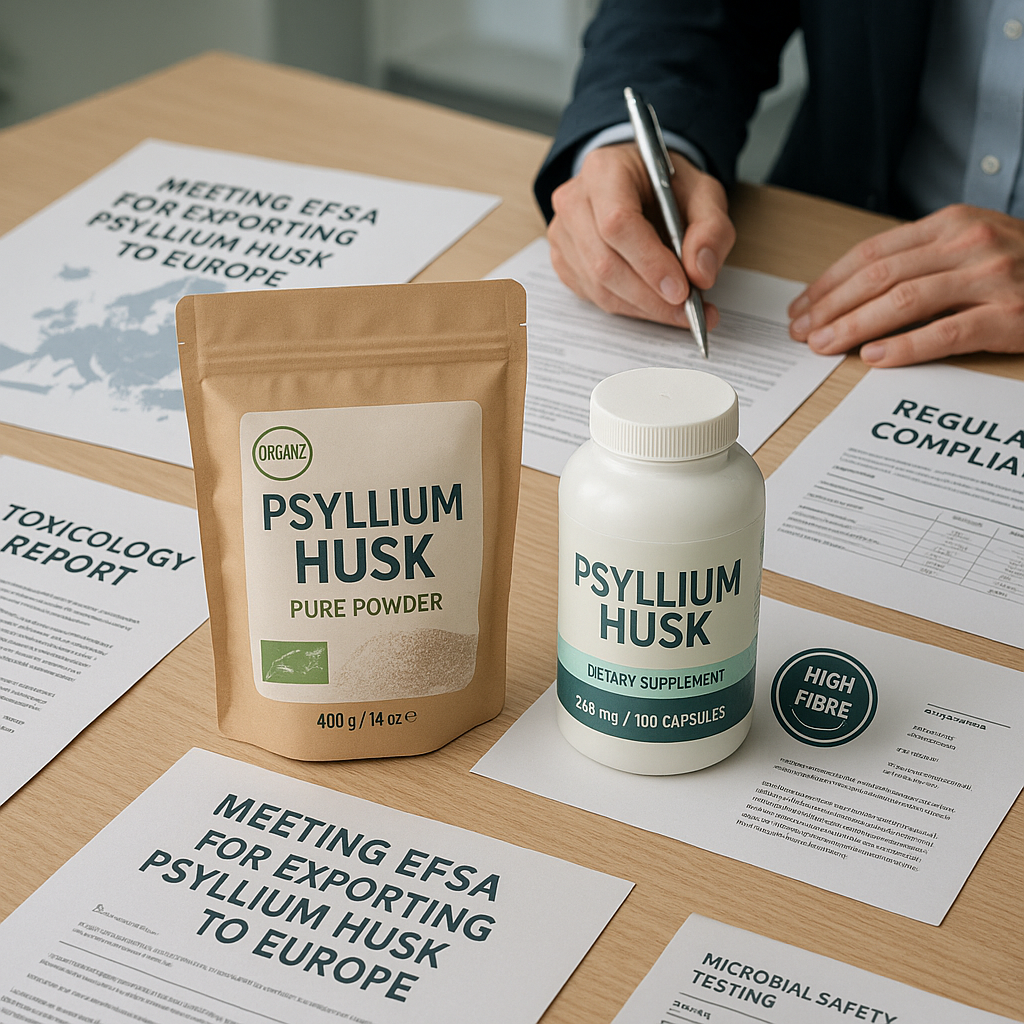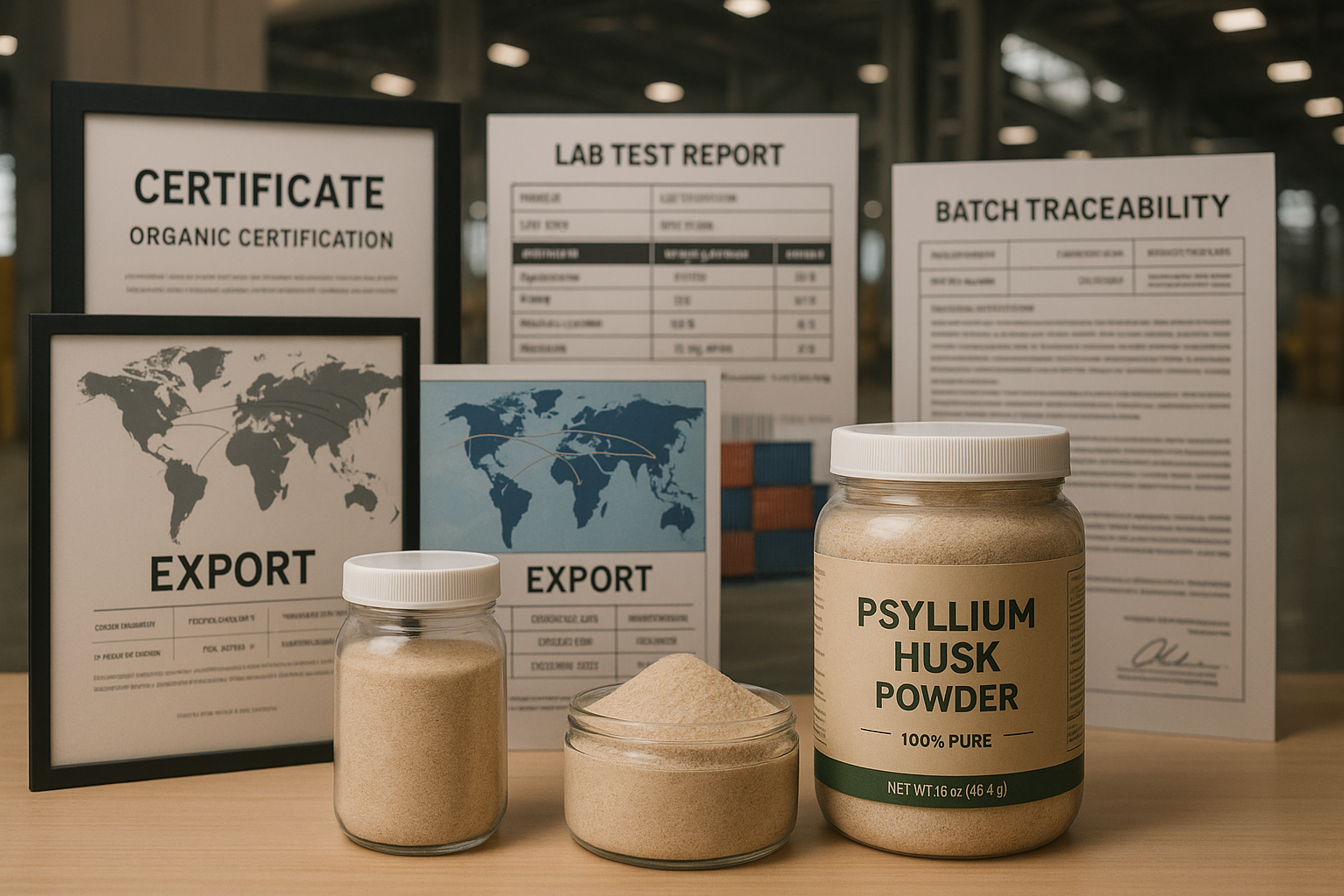Table of Contents
As demand for psyllium husk powder continues to grow across industries, particularly in the food, pharmaceutical, and wellness sectors, buyers are increasingly focused on ensuring that their psyllium suppliers meet stringent quality standards and compliance requirements. These considerations are especially crucial when exporting psyllium husk to international markets, where regulatory frameworks, shelf stability, and packaging standards vary significantly. This article explores essential factors such as certifications, lab testing, batch traceability, shelf stability, and the logistics involved in exporting psyllium husk globally, with a focus on the specific requirements buyers must meet in regions like Europe, the USA, and the Middle East.
What Certifications Matter for Global Buyers in Psyllium Husk Supply?
For global buyers, the right certifications are critical in ensuring that the psyllium husk products they purchase meet international standards for safety, quality, and ethical sourcing. Certifications not only demonstrate a supplier’s commitment to quality but also help mitigate risks associated with product quality and regulatory compliance.
- ISO Certification: International Organization for Standardization (ISO) certifications ensure that manufacturers are following best practices in their production processes, including hygiene standards, quality management, and environmental sustainability. For psyllium husk suppliers, ISO certifications like ISO 9001 for quality management and ISO 22000 for food safety are essential.
- Halal Certification: For buyers in the Middle East and other Muslim-majority countries, Halal certification is a must. It assures that the psyllium husk is free from any ingredients or practices prohibited in Islam, ensuring that products meet religious dietary requirements.

- Organic Certification: For buyers focused on eco-conscious and health-conscious consumers, Organic certification (e.g., USDA Organic, EU Organic) guarantees that the psyllium husk is grown without synthetic pesticides or fertilizers, providing a sustainable and environmentally friendly option.
- GMP Certification: Good Manufacturing Practice (GMP) certification ensures that the psyllium husk powder is manufactured to high standards of cleanliness, safety, and quality control, making it suitable for use in food and pharmaceutical applications.
Meeting these certifications not only reassures buyers but also ensures that the psyllium husk powder is compliant with the necessary quality and safety standards required for international trade.
Why is Lab Testing and Batch Traceability Essential in Psyllium Exports?
- Lab Testing: Regular testing of psyllium husk powder for purity, microbial content, and heavy metals is essential for ensuring the product’s safety. Tests for allergens, pesticide residues, and pathogens (like Salmonella or E. coli) ensure that the psyllium is safe for human consumption, particularly when used in food or supplements.
- Batch Traceability: Batch traceability allows buyers to track the entire lifecycle of psyllium husk powder, from sourcing and manufacturing to shipping and delivery. This is crucial in cases where a recall might be necessary or if there are quality issues with a specific batch. Traceability helps mitigate risks and ensures transparency in the supply chain, giving both suppliers and buyers confidence in the product’s quality and safety.
Together, lab testing and batch traceability provide an essential layer of accountability and security for international transactions, ensuring that psyllium husk meets the necessary safety and regulatory standards.
How Can You Ensure Shelf Stability and Bulk Packaging for International Psyllium Orders?
- Shelf Stability: Psyllium husk powder can absorb moisture over time, potentially affecting its effectiveness and quality. Ensuring shelf stability involves controlling moisture levels during storage and transportation. Suppliers often package psyllium in moisture-proof, airtight containers to prevent degradation. Additionally, adding natural preservatives, such as antioxidants, can help prolong shelf life.
- Bulk Packaging: For international orders, bulk packaging is a common practice, especially for B2B transactions. Psyllium husk powder is often shipped in large quantities (e.g., 25-50 kg bags or bulk totes). Packaging materials must be sturdy, durable, and capable of protecting the powder during long-distance transport. Vacuum-sealed, double-lined, or moisture-resistant packaging ensures that the psyllium husk remains intact and free from contaminants.
How Do You Meet EFSA Guidelines When Exporting Psyllium Husk to Europe?

- Regulatory Compliance: EFSA guidelines cover everything from permissible levels of contaminants (such as heavy metals and pesticides) to the proper labeling of products. For psyllium husk powder, EFSA regulates its use in food supplements and functional foods, ensuring that the product is safe for consumption and properly marketed.
- Health Claims Approval: EFSA also oversees the health claims associated with psyllium husk, such as its benefits for digestion or heart health. Any claims made on the packaging or marketing materials must be supported by scientific evidence approved by EFSA.
- Toxicology and Microbial Safety: EFSA sets standards for the microbial safety of psyllium, ensuring that it is free from harmful pathogens. Furthermore, it ensures that psyllium does not contain any levels of toxic substances that would pose a risk to consumers in Europe.
What Do Psyllium Buyers Look for in FDA, Halal, Organic, and ISO Certifications Before Signing Contracts?
- FDA Certification (USA): The U.S. Food and Drug Administration (FDA) ensures that psyllium husk products, especially those intended for consumption in food supplements, meet safety, quality, and labeling standards. FDA certification assures buyers that the psyllium powder is manufactured in compliance with U.S. regulations and that it is safe for consumer use.
- Halal Certification: For buyers in Muslim-majority countries, Halal certification is crucial. It guarantees that the psyllium husk powder is free from any non-Halal ingredients and that its processing adheres to religious dietary laws.
- Organic Certification: Organic certifications, such as USDA Organic or EU Organic, are highly valued by buyers looking to meet the growing demand for clean-label, sustainably sourced ingredients. Organic psyllium husk is grown without synthetic pesticides or fertilizers, offering a more eco-friendly and health-conscious option.
- ISO Certification: International Organization for Standardization (ISO) certifications like ISO 9001 for quality management and ISO 22000 for food safety provide credibility and assurance that the psyllium powder is produced following internationally recognized standards, ensuring consistent quality and safety across batches.
Conclusion
Ensuring quality, compliance, and logistics in the psyllium husk supply chain is crucial for businesses engaged in international trade. From obtaining essential certifications like ISO, Halal, and Organic to ensuring product safety through lab testing, batch traceability, and EFSA guidelines, these factors are central to maintaining high standards for psyllium products. Additionally, understanding how to manage shelf stability, bulk packaging, and logistics ensures smooth and efficient international transactions. By focusing on these critical aspects, both suppliers and buyers can navigate the complexities of the global psyllium market and foster long-term, successful business relationships.



